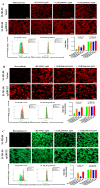GSK2606414 Sensitizes ABCG2-Overexpressing Multidrug-Resistant Colorectal Cancer Cells to Chemotherapeutic Drugs
- PMID: 38002103
- PMCID: PMC10669325
- DOI: 10.3390/biomedicines11113103
GSK2606414 Sensitizes ABCG2-Overexpressing Multidrug-Resistant Colorectal Cancer Cells to Chemotherapeutic Drugs
Abstract
Colorectal cancer is a common malignant tumor. A major factor in the high mortality rate of colorectal cancer is the emergence of multidrug resistance (MDR). Overexpression of the ABCG2 gene in cancer cells directly leads to MDR. Finding new inhibitors of ABCG2 may be an effective way to overcome drug resistance. We found that the compound GSK2606414 enhanced the sensitivity of the ABCG2 substrate to the chemotherapeutic drugs mitoxantrone and doxorubicin in ABCG2-overexpressing multidrug-resistant colorectal cancer cells by increasing their intracellular accumulation without affecting the protein expression of ABCG2. Molecular docking experiments predicted that GSK2606414 could stably bind in the drug-binding pocket of ABCG2. In conclusion, GSK2606414 can sensitize ABCG2-overexpressed multidrug-resistant colorectal cancer cells to chemotherapy drugs and can be used as a potential inhibitor of ABCG2.
Keywords: ABCG2; GSK2606414; colorectal cancer; multidrug resistance.
Conflict of interest statement
The authors declare no conflict of interest.
Figures



Similar articles
-
Dorsomorphin attenuates ABCG2-mediated multidrug resistance in colorectal cancer.Front Pharmacol. 2024 May 24;15:1393693. doi: 10.3389/fphar.2024.1393693. eCollection 2024. Front Pharmacol. 2024. PMID: 38855753 Free PMC article.
-
AZ32 Reverses ABCG2-Mediated Multidrug Resistance in Colorectal Cancer.Front Oncol. 2021 May 20;11:680663. doi: 10.3389/fonc.2021.680663. eCollection 2021. Front Oncol. 2021. PMID: 34094985 Free PMC article.
-
Reversal effect of FW-04-806, a macrolide dilactone compound, on multidrug resistance mediated by ABCB1 and ABCG2 in vitro and in vivo.Cell Commun Signal. 2019 Sep 1;17(1):110. doi: 10.1186/s12964-019-0408-5. Cell Commun Signal. 2019. PMID: 31472682 Free PMC article.
-
Rociletinib (CO-1686) enhanced the efficacy of chemotherapeutic agents in ABCG2-overexpressing cancer cells in vitro and in vivo.Acta Pharm Sin B. 2020 May;10(5):799-811. doi: 10.1016/j.apsb.2020.01.008. Epub 2020 Jan 26. Acta Pharm Sin B. 2020. PMID: 32528828 Free PMC article.
-
The WD repeat-containing protein 5 (WDR5) antagonist WDR5-0103 restores the efficacy of cytotoxic drugs in multidrug-resistant cancer cells overexpressing ABCB1 or ABCG2.Biomed Pharmacother. 2022 Oct;154:113663. doi: 10.1016/j.biopha.2022.113663. Epub 2022 Sep 5. Biomed Pharmacother. 2022. PMID: 36081287
Cited by
-
Molecular signatures of disulfidptosis: interplay with programmed cell death pathways and therapeutic implications in oncology.Cell Mol Biol Lett. 2025 Jun 2;30(1):66. doi: 10.1186/s11658-025-00743-5. Cell Mol Biol Lett. 2025. PMID: 40457177 Free PMC article. Review.
-
Crosslink among cyclin-dependent kinase 9, ATP binding cassette transporter G2 and Beclin 1 in colorectal cancer.World J Gastrointest Oncol. 2024 Dec 15;16(12):4778-4781. doi: 10.4251/wjgo.v16.i12.4778. World J Gastrointest Oncol. 2024. PMID: 39678806 Free PMC article.
-
Dorsomorphin attenuates ABCG2-mediated multidrug resistance in colorectal cancer.Front Pharmacol. 2024 May 24;15:1393693. doi: 10.3389/fphar.2024.1393693. eCollection 2024. Front Pharmacol. 2024. PMID: 38855753 Free PMC article.
-
ML210 Antagonizes ABCB1- Not ABCG2-Mediated Multidrug Resistance in Colorectal Cancer.Biomedicines. 2025 May 20;13(5):1245. doi: 10.3390/biomedicines13051245. Biomedicines. 2025. PMID: 40427071 Free PMC article.
-
The Link Between Endoplasmic Reticulum Stress and Lysosomal Dysfunction Under Oxidative Stress in Cancer Cells.Biomolecules. 2025 Jun 25;15(7):930. doi: 10.3390/biom15070930. Biomolecules. 2025. PMID: 40723802 Free PMC article. Review.
References
Grants and funding
LinkOut - more resources
Full Text Sources

